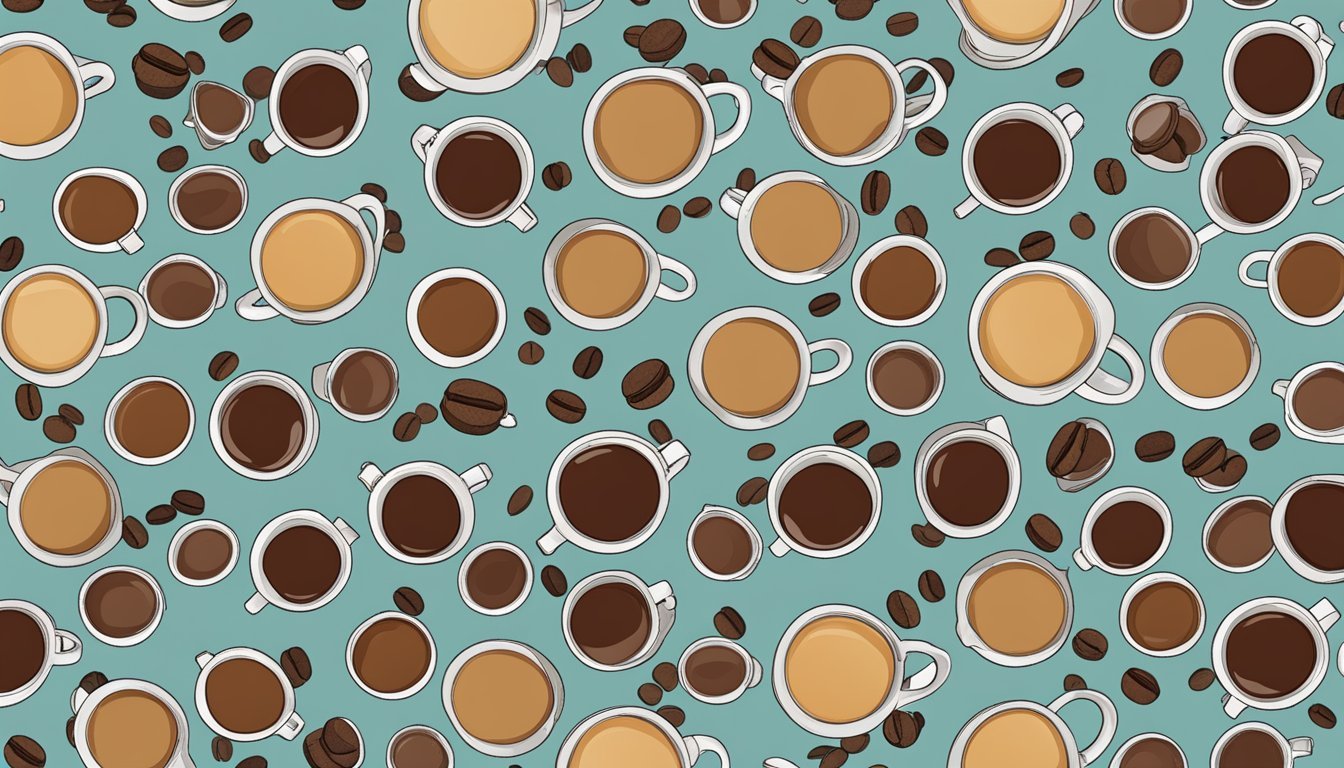How Many Cups of Caribou Coffee Per Day Is Too Much?
Understanding Safe Consumption Limits
When it comes to coffee, caffeine is the ingredient most consumers are mindful of, especially in their daily intake. While moderate coffee consumption can be part of a healthy lifestyle, there is a threshold where it can become excessive and potentially harmful. For Caribou Coffee drinkers, this balance is essential, particularly since some of their beverages contain higher levels of caffeine. The Food and Drug Administration (FDA) recommends a limit of 400 milligrams of caffeine per day for the average adult, which is about four or five 8-ounce cups of regular coffee. However, variations in coffee size and caffeine content can affect how many cups of Caribou Coffee would approach this limit.
Caribou Coffee offers a wide array of beverages, ranging from the traditional brewed coffee to more caffeine-dense options like their "Depth Charge," which contains a considerable 445 milligrams of caffeine in a large size. With such variations, consumers need to be well-informed about how much caffeine is in their favorite Caribou Coffee drink. Sticking to this FDA guideline helps ensure that coffee aficionados can enjoy their preferred beverage without exceeding the recommended caffeine intake.
Since the caffeine content in Caribou Coffee drinks can differ dramatically, customers should be aware of the specific amounts in their beverages of choice. An Iced Americano, for example, boasts about 450 milligrams of caffeine—already surpassing the daily recommended limit with just a single large drink. Therefore, when choosing from the Caribou Coffee menu, individuals should consider not just the flavor but also the caffeine content to determine how much they can safely enjoy throughout their day.
Understanding Caffeine and Coffee
In assessing the limits of caffeine intake with Caribou Coffee, one must understand caffeine's role and coffee's status as a preferred beverage. This knowledge is crucial for gauging daily consumption.
What Is Caffeine?
Caffeine is an alkaloid compound which acts as a central nervous system stimulant. In its pure form, it is a white, bitter substance, but most people are introduced to it through various foods and beverages. Coffee, a major source of caffeine, typically contains this compound in varying concentrations depending on the type and preparation of the coffee. For example, a single shot of espresso might have about 63 milligrams of caffeine, whereas an 8-ounce cup of brewed coffee can contain roughly 95 milligrams.
Coffee as a Popular Beverage
Coffee stands out as a globally revered beverage, both for its flavor and its stimulating effect due to caffeine content. It is consumed in a variety of forms, including brewed coffee, espresso, and iced coffee. The caffeine content in coffee can vary significantly:
A regular 16-ounce Caribou Brewed Coffee has 305 milligrams of caffeine.
Caribou's Iced Americano packs about 450 milligrams for the same size cup.
Individuals can choose from a multitude of coffee blends and strengths, tailored to their preference and sensitivity to caffeine.
Health Impacts of Coffee Consumption
Consumption of coffee, such as that from Caribou Coffee, has been scrutinized in numerous studies, revealing both health benefits and potential risks. Moderation is key as the health impacts can vary widely based on the quantity consumed and individual health conditions.
Positive Effects on Health
Consuming coffee has been associated with various health benefits. Research suggests that coffee drinkers may have a lower risk of several serious diseases.
Type 2 Diabetes: Studies have found that coffee consumption may reduce the risk of developing type 2 diabetes. This is attributed to its antioxidants, which can impact insulin sensitivity and glucose metabolism.
Neurological Diseases: Regular coffee drinking may be inversely associated with the risk of Parkinson’s disease, Alzheimer's disease, and other forms of dementia. The caffeine and other compounds in coffee might have neuroprotective properties.
Liver Health: Coffee consumption is linked to a lower incidence of chronic liver disease, including a reduced risk of cirrhosis and liver cancer.
Cardiovascular Health: Moderate coffee drinking might be beneficial for cardiovascular health. Contrary to past beliefs, it has been associated with a lower risk of stroke and heart failure in some studies.
Potential Risks and Side Effects
Despite the potential health benefits, coffee can also pose certain risks and side effects, particularly when consumed in large amounts.
Cardiovascular Disease and High Blood Pressure: Some individuals might experience an increase in heart rate and high blood pressure. High consumption, typically over six cups a day, can increase the risk of heart disease.
Bone Health: Overconsumption of caffeine may interfere with calcium absorption, which can contribute to bone thinning.
Gastrointestinal Issues: Coffee can cause stomach discomfort, acid reflux, and may irritate the lining of the stomach.
Anxiety and Sleep Disturbances: High amounts of caffeine can lead to feelings of nervousness, insomnia, and even panic attacks in sensitive individuals. It can disrupt sleep patterns, leading to sleep deprivation.
Pregnancy Concerns: Pregnant women are advised to limit their caffeine intake, as excessive consumption has been linked to low birth weight and other complications.
In conclusion, while coffee drinking may offer several health advantages, it is not without its potential downsides. Understanding these can help consumers make informed decisions about their coffee intake.
Data on Safe Levels of Coffee Intake
In determining safe levels of coffee consumption, it's crucial to consider general guidelines applicable to most people and specific considerations for various demographic groups.
General Guidelines for Coffee Intake
For the average adult, research supports that moderate coffee consumption — typically defined as two to five cups per day — can have health benefits. According to a review by Harvard Health, this level of intake may be protective against heart disease, diabetes, and some cancers.
Healthy adults are generally advised that up to 400 milligrams of caffeine per day is a safe amount. This equates to about four 8-ounce cups of coffee.
The U.S. Dietary Guidelines for Americans, which are compiled by the U.S. Department of Health and Human Services, do not recommend more than three to five 8-ounce cups per day. This provides roughly 400 milligrams of caffeine and can fit into a healthy diet for most people.
The U.S. Food and Drug Administration echoes this guidance, stating these levels are not generally associated with dangerous, negative effects.
Specific Considerations for Different Groups
Certain groups of people should approach coffee consumption with more caution due to potential health concerns:
Pregnant women are advised by many health organizations including the National Institutes of Health to limit caffeine intake to less than 200 milligrams per day, corresponding to about two 8-ounce cups of coffee.
The same cautious approach is recommended for breastfeeding women, as caffeine can pass into breast milk and might affect the infant.
Children and adolescents should have lower caffeine intake compared to adults, with some recommendations suggesting that adolescents keep caffeine consumption below 100 milligrams per day.
Individuals with certain medical conditions or those sensitive to caffeine should consult with healthcare providers for personalized advice. In such cases, decaf coffee might be a safer alternative, as it contains only small amounts of caffeine.
It is essential for each individual to monitor their own response to coffee and caffeine and adjust their intake accordingly to avoid side effects such as anxiety, nervousness, and insomnia.
Psychological Effects of Caffeine
Caffeine, commonly consumed in drinks like Caribou Coffee, primarily affects the central nervous system, where it influences mental alertness and can have various psychiatric effects depending on the dosage and individual caffeine tolerance.
Caffeine and Mental Alertness
Caffeine acts as a central nervous system stimulant, where it temporarily wards off drowsiness and restores alertness. It achieves this effect by blocking the action of adenosine, a neurotransmitter that promotes sleep and relaxation. The capacity to enhance alertness makes caffeine a preferred study aid among students, who often seek to sustain their concentration during long study sessions.
Typical serving of Caribou Coffee: 305 mg of caffeine per 16-ounce serving
Safe daily caffeine intake: Up to 400 milligrams for most healthy adults
Caffeine's impact on mental alertness is prominent at moderate doses and can lead to enhanced cognitive performance. However, individuals respond differently based on their unique caffeine tolerance levels.
Potential Psychiatric Effects
While moderate caffeine consumption can improve focus and energy levels, excessive intake can lead to adverse psychiatric effects.
Anxiety: High doses of caffeine can exacerbate feelings of anxiety, manifested as nervousness or restlessness.
Sleep Disorders: Excessive caffeine use, especially when consumed later in the day, can interfere with sleep patterns, leading to reduced sleep quality and quantity.
Health Complications: Overconsumption may also aggravate health issues, particularly in those with pre-existing psychiatric conditions.
It is essential to mind the caffeine content when consuming products like Caribou Coffee, considering both the milligrams of caffeine per serving and the individual's sensitivity. Monitoring these elements can help maintain mental health and prevent the potential negative effects of caffeine overconsumption.
Comparative Analysis of Coffee and Other Caffeinated Drinks
This section provides a focused comparison of caffeine content in coffee with that of tea and carbonated beverages including soda and energy drinks.
Coffee Versus Tea
Tea typically contains less caffeine than coffee, with an 8-ounce serving of black tea having about 40 to 70 milligrams of caffeine whereas the same volume of green tea has approximately 15 to 45 milligrams. In contrast, an 8-ounce cup of brewed coffee can contain 95 to 200 milligrams of caffeine, depending on factors such as bean type, brew strength, and preparation method.
Beverage Avg. Caffeine Content per 8 oz Black Tea 40-70 mg Green Tea 15-45 mg Brewed Coffee 95-200 mg
The caffeine in tea interacts with theanine, which can moderate caffeine's effects on the heart rate compared to coffee. Moreover, some herbal teas are naturally caffeine-free, offering various flavor profiles without the stimulant.
Comparing Soda, Energy Drinks, and Coffee
Soda or cola typically offers a lower caffeine amount, with a 12-ounce can holding about 30 to 40 milligrams of caffeine which is less than half the caffeine found in an equivalent volume of coffee. However, soda often contains high levels of sugar, which can influence energy levels in addition to its caffeine content.
Type Avg. Caffeine Content Cola (12 oz) 30-40 mg Energy Drink (8 oz) 70-200 mg Brewed Coffee (8 oz) 95-200 mg
Energy drinks have significantly more caffeine, frequently ranging from 70 to 200 milligrams per 8 ounces, comparable to or exceeding the caffeine content in coffee. These drinks may also include additional stimulants like taurine and large amounts of sugar, which can lead to a rapid increase in energy and heart rate, but they may pose health risks if consumed excessively.
Nutritional Considerations and Additives in Coffee
When considering how many cups of Caribou Coffee one should consume daily, it is important to account for the nutritional components, such as caloric content and sugars, as well as non-caffeine components like milk or cream, which can have implications on overall health.
Caloric Content and Sugars
Caribou Coffee beverages vary greatly in caloric content. A medium-16 fl oz Coffee of the Day contains 5 calories and 0 grams of sugar. However, their specialty drinks like the Turtle Mocha Cooler in a small-16 fl oz serving scale up significantly to 770 calories and 99 grams of sugar. The high sugar content is primarily from added sugars such as sweeteners and chocolate syrups.
Coffee of the Day (Medium-16 fl oz):
Calories: 5
Sugars: 0g
Turtle Mocha - Cooler (Small-16 fl oz):
Calories: 770
Sugars: 99g
These numbers illustrate the impact that added ingredients like sweeteners and chocolate can have on the nutritional value of a coffee beverage.
Non-Caffeine Components
Aside from caffeine, Caribou Coffee drinks may contain various non-caffeine components that can affect one's diet. Add-ins like milk, cream, and flavors can introduce additional fat, calories, and sugars. A single serving of milk or cream can contain anywhere between 20 to 50 calories, with varying amounts of fat.
Milk/Cream Add-ins (per serving):
Calories: 20-50
Fat: Varies
Moreover, non-caffeine components such as potassium, found in milk, contribute to the foods and nutrition profile of a coffee beverage. Nutritional content will vary depending on the specific type of milk or cream used.
Special Topics in Coffee Research
Exploring the intersection of coffee consumption and health, current research delves into its impact on chronic diseases and the influence of genetic makeup on caffeine metabolism.
Coffee and Chronic Diseases
Recent studies have indicated a correlation between coffee intake and a reduced risk of several chronic diseases. Consistent coffee consumption is associated with a lower risk of heart disease, type 2 diabetes, and certain types of cancers. For instance, a moderate intake of coffee—defined as two to five cups daily—may provide protective benefits against these conditions. However, exceeding this amount can lead to unwanted effects such as anxiety and insomnia.
The impact of coffee on chronic diseases extends to conditions like liver disease and stroke. It is suggested that the antioxidants found in coffee may support liver health and could potentially reduce the risk of stroke. Research is ongoing to further understand these connections.
Genetic Factors and Metabolism of Caffeine
An individual's response to caffeine can be significantly influenced by their genetic makeup, which determines the metabolism of caffeine in the body. Genes play a crucial role in the speed at which caffeine is processed and can explain varying levels of sensitivity to caffeine among different individuals. For example, slow metabolizers of caffeine may experience heightened and prolonged effects, which could increase the risk of heart disease in some cases.
Additionally, genetic factors are being studied in relation to caffeine’s potential impact on the development of Alzheimer's and Parkinson's disease. The rate of caffeine metabolism may influence the protection that coffee provides against these neurodegenerative conditions. Research continues to investigate how these genetic differences might affect the optimal size and frequency of coffee servings, especially in sensitive populations such as those who are pregnant, breastfeeding, or have pre-existing health conditions like kidney disease.
Adverse Reactions and Overconsumption
Consuming too much Caribou Coffee can lead to adverse reactions, particularly in adults sensitive to caffeine. Overconsumption of caffeine can manifest in a variety of symptoms and may exacerbate certain medical conditions.
Recognizing Symptoms of Overconsumption
It is crucial to understand and identify symptoms that may arise from consuming too much caffeine. Adults are generally advised to limit their caffeine intake to no more than 400 milligrams per day, which equates to roughly four cups of brewed coffee. Exceeding this amount could result in:
Anxiety: A common side effect, where the individual feels jittery or unnerved.
Sleep disturbances: Difficulty falling or staying asleep.
Increased heart rate: An uncomfortable and often rapid heartbeat.
Upset stomach or nausea: Gastrointestinal distress that might lead to vomiting.
Migraines: Caffeine overuse can trigger severe headaches.
These symptoms are signals that the body is not responding well to the level of caffeine consumed.
Medical Conditions and Caffeine Sensitivity
Caffeine sensitivity varies from person to person, and those with certain medical conditions need to be particularly cautious. Here are specific considerations for individuals with underlying health concerns:
High Blood Pressure: Caffeine is a stimulant and may lead to temporary spikes in blood pressure.
Heart Disease: Those with heart conditions should monitor caffeine intake as it might affect their heart rate.
Parkinson's Disease: While caffeine may help manage some symptoms of Parkinson's, it's important to consult a healthcare provider for personalized advice.
Seizures: Caffeine has the potential to exacerbate seizures, so those with a seizure disorder should consume it with caution.
Caffeine Tolerance: Individuals with higher caffeine tolerance may not experience effects as acutely, but the long-term health implications remain.
In all cases, lifestyle, health status, and any caffeine-containing supplements must be considered to avoid adverse effects. Consultation with healthcare professionals from reputable institutions like Harvard Health is recommended for those with existing diseases or when planning significant changes to caffeine consumption.
Regulatory and Health Organization Recommendations
The recommendations by health organizations and regulatory bodies regarding caffeine intake emphasize moderation to mitigate health risks, with specific guidelines for the general population as well as vulnerable groups such as pregnant women.
Global Perspectives on Caffeine Intake
Research published in The New England Journal of Medicine and studies reviewed by Harvard Health point to a consensus that moderate coffee consumption can be part of a healthy diet. Globally, safe levels of caffeine intake for healthy adults tend to align around the following figures:
The U.S. Food and Drug Administration (FDA) considers 400 milligrams of caffeine per day—the equivalent of four or five cups of coffee—as an amount not generally associated with dangerous, negative effects.
The American Journal of Clinical Nutrition suggests a threshold below which caffeine intake is considered safe for most healthy adults.
National Dietary Guidelines and Advice
In the United States, the U.S. Department of Health and Human Services along with the Mayo Clinic suggest that most people can safely consume up to 400 milligrams of caffeine daily. In contrast, the National Institute of Health USA advises pregnant women to limit their caffeine consumption to 150-250 mg per day, which equates to about two cups of coffee.
In Australia, a study published by Healthline indicates that drinking six or more cups of coffee a day may elevate a person's heart disease risk by up to 22 percent, which categorically exceeds the recommended amount.
For those who are pregnant or breastfeeding, excessive caffeine consumption carries additional risks. Therefore, health organizations recommend a more conservative caffeine intake threshold for these populations, as substantiated by Food and Nutrition guidelines that align with the research consensus.
Conclusion
According to the Food and Drug Administration (FDA), the recommended cap for an individual’s daily caffeine intake is 400 milligrams. Given that a 16-ounce serving of Caribou Coffee contains approximately 305 milligrams of caffeine, consumers should limit their intake to no more than one 16-ounce cup of Caribou Coffee per day to stay within these guidelines.
Affirming this, research demonstrates that moderate coffee consumption can be incorporated into a healthy diet, with potential benefits such as protection against various diseases. However, exceeding the recommended caffeine intake could potentially lead to unwanted side effects such as insomnia, nervousness, and an increased heart rate.
Individuals who are sensitive to caffeine, pregnant, breastfeeding, or have certain health conditions should consult a healthcare provider to determine a safe consumption level. It is imperative for consumers to be aware of their body’s response to caffeine and adjust their coffee intake accordingly.
For those looking to enjoy coffee as part of their daily routine, it is wise to be mindful of the caffeine content per serving and aim to maintain intake within the safe limits established by health authorities.












